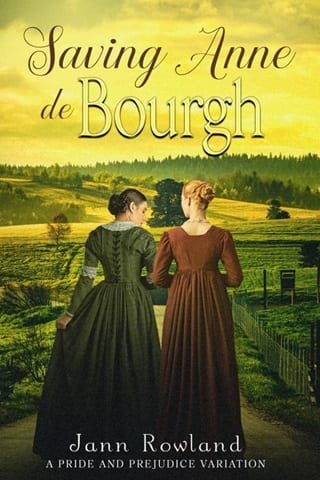Chapter XXXI
E xcited, Elizabeth watched the scene, an incandescent happiness spreading through her very being. Jane, who stood with Mr. Bingley on the other side of the room, fairly radiated her joy and contentment, while the gentleman looked at her with adoration. There was, in Mr. Bingley's eyes, a hint of tension, and perhaps even shock, but that was rapidly fading before the utter satisfaction of his current situation.
"This young rapscallion invaded my library only five minutes ago," Mr. Bennet had announced the previous day, as he looked upon them with the amusement with which he often saw the world. "After a great deal of persuasion, for I could not part with my most angelic daughter to anyone unworthy, I considered his suit and gave my reluctant approval.
"Mrs. Bennet," said he, turning to his wife, considering her through mischief-filled eyes, "I believe you may begin planning a wedding for your eldest."
The extent of Mrs. Bennet's reaction on the occasion shall be left to the readers' imaginations, for it would not do to make the woman appear foolish. Having expected this, Mr. Bennet regarded her for several long moments before he interjected yet again.
"Mrs. Bennet, I remind you of two important points. The first is that your daughter and her beau wish to be married before the turn of the century—thus, I adjure you to take pity on us all and plan a wedding to take place before the end of summer. The second is that we do not possess unlimited resources, and the future employment of a companion for our youngest daughters will further tax our means. Please, I beg you, do not pauper us in the process of celebrating Jane's fete."
While Kitty and Lydia appeared glum at the reminder, Mrs. Bennet shot her husband a censorious look. "I have no intention of beggaring us, Mr. Bennet. But we cannot plan these things quickly. Christmas would be best."
"No, Mama," said Jane, contradicting her mother on one of the few occasions Elizabeth could remember. "Charles and I wish to be married before the end of summer."
Mrs. Bennet gasped. "That is not possible, Jane. Why, the flowers! The trousseau! There are hundreds of other details we must decide. And what will the neighbors think?"
"They will think it is about time," said Mr. Bennet, "given the dance of courtship in which they engaged almost a year ago. You would not wish to try the groom's patience by making him wait so long, would you?"
That was not the end of the matter, for Mrs. Bennet was stubborn. The implied threat, however, ultimately convinced her, for in Mrs. Bennet's mind, the need to celebrate with the appropriate fervor paled in comparison with the absolute necessity of securing the family's future. Thus, they resolved on the end of August.
"Your father seems to have a way about him."
Pulled from her reminiscences, Elizabeth turned to the gentleman by her side, noting his attention was fixed on Jane and Mr. Bingley. Mr. Darcy and Mr. Bingley had come that morning to visit, promising their families would follow them soon, their eagerness to be in the company of Longbourn's two eldest daughters unmistakable.
"That is one way to put it," replied Elizabeth. "Do you mean anything in particular?"
Mr. Darcy grinned, a sight that was becoming far more common and quite became him. "When we returned to Netherfield yesterday, Bingley confided that he never wished to provoke your father's displeasure. It seems Mr. Bennet put the fear of God into him during the interview in which he petitioned for her hand."
Elizabeth put a hand over her mouth, noting that Jane's regard was on her, no doubt understanding the subject of their conversation. Jane's eyes darted to Mr. Bingley, then to her father, and when they returned to Elizabeth, she gave a little glance heavenward. It was a bit of impish humor in which Jane rarely indulged; that she did so now displayed her unqualified happiness.
"I see your sister knows of it," observed Mr. Darcy, having witnessed the exchange.
"Papa teased her on the subject," replied Elizabeth. "Papa sees it as his duty to ensure that a man suing for the pleasure of his daughters' hands would emerge from the experience changed."
"Given how green Bingley looked yesterday," said Mr. Darcy, "I cannot say he failed. Bingley could tell me little, for he did not wish to recall it. That is unfortunate, for the information would have been invaluable."
Elizabeth turned to the gentleman and regarded him, showing him a hint of skepticism. "I am uncertain what you mean, sir. How could it affect you?"
"For no reason, I suppose," said Mr. Darcy. "As I am older and possess more natural confidence, I cannot think your father's displeasure will cause me nearly so much distress."
"For a man who has no agreement with a woman," said Elizabeth, "you appear rather confident."
"Confidence, Miss Elizabeth, is a quality much to be prized when a man must deal with a woman of your character."
Elizabeth regarded him critically, but before she could muster a response, the rest of Mr. Darcy's party arrived as they had promised. Elizabeth shot the gentleman a look that should inform him the conversation was not over and turned to greet her friends. Anne and Colonel Fitzwilliam came to them at once, exclaiming their pleasure, while Georgiana said a quick hello and turned her attention to the younger Bennets. The attention of the room, however, was fixed upon the Bingley sisters, who approached Jane and Mr. Bingley at once.
"My dear Jane!" exclaimed Miss Bingley in a manner reminiscent of her insincere overtures the previous year. "How wonderful it is to see you! Charles told us the good news—we could not come quickly enough to offer our felicitations and state our eagerness to have you as a sister."
While Miss Bingley served as the voice of the two sisters, Mrs. Hurst stepped close and offered her quiet congratulations. Unless Elizabeth missed her guess, the latter offered her compliments with more genuine pleasure and sincerity than the former, though Miss Bingley gave every appearance of delight.
Jane accepted their congratulations with the reserve that was so essential a part of her character, and to all the world appeared brimming with pleasure. Elizabeth saw, however, that while Jane was happy as she could be, there was an additional measure of reserve in her thanks to the sisters. Only those intimately acquainted with Jane could have seen it—Elizabeth was certain neither sister understood her hesitation.
"What is it, Miss Elizabeth?" said Mr. Darcy when Elizabeth chuckled quietly.
"I am surprised you cannot see it, Cousin," said Anne, proving her perceptive nature. "I understand what happened between them last year imperfectly, but even I can see Miss Bennet greeted their best wishes with more reserve than usual."
"Anne is correct," said Elizabeth, throwing a smile at her friend. "Jane is the dearest and most forgiving soul in the world, but her experiences, especially with Miss Bingley, altered her perceptions of the ladies. They will need to prove themselves to her before she will allow anything more than the most basic intimacy."
"As Bingley informed them himself," said Mr. Darcy with a satisfied nod.
Elizabeth nodded but peered at the gentleman with some interest. "What of Miss Bingley's ambitions toward you?"
The gentleman shrugged. "I can say nothing of her thoughts, of course, but of late she has been downright easy to tolerate."
"Oh?"
"She is silent more often than not," said Mr. Darcy. "I have heard nothing of her opinions of you, her constant desire to recommend herself to me, and Georgiana reports that her efforts to praise and ingratiate herself into her confidence are a thing of the past."
"That is interesting, Mr. Darcy," said Elizabeth. "What do you suppose provoked such a significant alteration in her behavior?"
"Darcy's verbal flaying of her might have had something to do with it," said Colonel Fitzwilliam sotto voce .
Anne giggled and Mr. Darcy shook his head. As Elizabeth remembered the gentleman saying something of their confrontation, she looked across the room to Miss Bingley, noting that she now sat close to Jane and appeared to be speaking earnestly with her, Mrs. Hurst close by her side. Mr. Bingley, though he regarded all with a genial smile, watched the interaction, his vigilance clear to anyone who cared to look. It appeared Mr. Darcy's assertions were correct, for Elizabeth had been in Miss Bingley's company enough to witness her constant looks to the gentleman, whether in seeking approval or to measure his interest in her doings. Yet that morning she did not so much as glance at Mr. Darcy.
"Even after that confrontation," said Mr. Darcy, "she clung to some vestige of her hopes. It was only after the dinner you attended at Netherfield that I saw a change in her."
"Or the conversation thereafter," said Anne. At Elizabeth's interested look, Anne clarified: "The discussion concerned Darcy's invitation to your aunt and uncle and how he saw them as no different from his friendship with Mr. Bingley."
"Once she heard that," said Darcy, "I can only assume she finally understood that nothing of your situation gave me the slightest pause."
"I suspect it was the knowledge that Miss Elizabeth would soon visit your estate," said Fitzwilliam.
"Whatever it was," said Mr. Darcy with a nod at his cousin, "she appears to have given up any pretense of trying to gain my approval. I hope she uses this knowledge to attract some gentleman to propose, for if she does not, Bingley will remain responsible for her."
"Given what has passed between them," said Elizabeth, understanding the dilemma, "I cannot imagine Jane will be comfortable with Miss Bingley living in her house forever, even if she makes amends."
"And Miss Bingley will be loath to relinquish her place as the mistress of her brother's house, a position she has held since she was old enough to assume the position." Mr. Darcy shook his head. "I doubt she would be so crass as to challenge your sister's authority, but I would not put it beyond her to give orders as if she were still in control of the house."
"Then I must hope for her success," murmured Elizabeth.
"You have not heard the best of our news yet," said Colonel Fitzwilliam, hilarity staining her voice.
"You speak of something particular?" asked Elizabeth.
"What my overly jocose cousin is trying to jest," said Anne, "is that my mother intends to go north with us when Darcy returns to Pemberley."
A shade of dread fell over Elizabeth's mind. "Can I suppose she has a purpose for this decision?"
"If you expect she means to examine your aunt and uncle and ensure you will all do Darcy credit, you are not far from the truth."
Elizabeth looked at Colonel Fitzwilliam with dismay, noting his barely restrained glee at the notion of his aunt sticking her overly enormous nose into matters that did not concern her. Darcy was shaking his head, not in denial, but in resignation at his aunt's officiousness, while Anne's feelings appeared to be in the middle somewhere. At that moment, Lady Catherine sat close to Mrs. Bennet, and as was her custom, she had assumed most of the burden of conversation, relegating Mrs. Bennet to the position of supplicant. Not that her mother appeared unhappy—Elizabeth knew from her mother's lips that Mrs. Bennet now regarded Lady Catherine as a most erudite woman, one from whom she could learn much. It was not unlike Mr. Collins's reverence for the lady, as nauseating a notion as that was.
"Do not concern yourself, Elizabeth," said Anne, reaching out to pat Elizabeth's hand. "I shall also go and do my utmost to curb my mother's behavior."
Elizabeth looked at her, dubious as to Anne's ability to do anything about her mother.
"Miss Elizabeth does not appear to trust you, Annie," said Colonel Fitzwilliam.
"That is enough from you," was Anne's prim response. "My mother is not nearly so much of a dragon as all this."
"Yes, she is," said Mr. Darcy and Colonel Fitzwilliam in tandem, provoking them all to mirth.
"Oh, fiddlesticks!" said Anne. "Elizabeth, you have spoken of your aunt and uncle in such terms as to suggest they are excellent people."
"They are," replied Elizabeth. "My aunt and uncle are the finest of my acquaintances. Were I to introduce you to them and you had no foreknowledge of my uncle's profession, you would assume they were gentlefolk."
"Then that guarantees my mother's approval." Anne smiled at her. "Mama drones on about the barriers between the classes, but what she truly cannot abide is poor behavior and those who attempt to portray themselves as something they are not."
"Which is why she disdains Miss Bingley," said Mr. Darcy, while Colonel Fitzwilliam drawled: "The notion of your mother accusing another of poor behavior is rather droll."
Anne nodded to the former and glared at the latter. Colonel Fitzwilliam put his hands out in surrender.
"I believe I shall speak with Mr. Bennet, for it seems my little cousin does not appreciate my wit."
"The problem is, Cousin," said Mr. Darcy, "that you consider them witticisms at all. The rest of us do not find you nearly so entertaining."
"That is simply because you lack the requisite sense of humor, Darcy," retorted Colonel Fitzwilliam.
The colonel then winked at Elizabeth and excused himself, joining Mr. Bennet as he had suggested. Anne watched him go, seeming rather dispassionate, while Darcy regarded his cousin with interest. The next words to pass between the cousins caught Elizabeth completely by surprise.
"You appear to be put out with our cousin," said Mr. Darcy.
"Sometimes he takes his jovial nature too far," said Anne. "I pity his future wife, for she must manage a child in a man's body."
"Fitzwilliam is not that bad," reproved Darcy.
"Then," added Mr. Darcy, considering his cousin carefully, "you are not interested in a closer relationship with Fitzwilliam."
Anne laughed in true amusement. "What gave you that notion?"
"When we were traveling to Meryton not knowing the situation, your mother harping about the need to marry at once to rehabilitate your reputation, Fitzwilliam suggested he should marry you instead, for several reasons I believe were good."
"Let me guess," replied Anne, appearing amused and exasperated at once, "his need to marry a woman with wealth and my need for a husband."
"The second yes, but not so much the first." Mr. Darcy appeared faintly apologetic. "You must understand, Anne, that we did not even know the identity of your paramour, though Fitzwilliam showed remarkable insight in suspecting Wickham from the start. We still do not know if any word of it might make it to the ears of society."
"I suppose that makes sense from your point of view," conceded Anne. "Then let me share my opinion. At present, I cannot say that I even wish to marry, and I certainly won't let anyone browbeat me into accepting a proposal just to save my reputation. I doubt society will learn anything of it, and if they do, I cannot imagine they will know enough to make me a pariah.
"The fault is mine, and I shall bear the burden of it. Fitzwilliam may search somewhere else for a wealthy bride, for I am not interested in him in that way. If he is very good, I may even make him my heir should I not marry."
"You do not wish to marry?" asked Mr. Darcy, regarding Anne with interest.
"I do not know," replied Anne, shrugging her unconcern. "Though my mother exaggerates, there are some legitimate concerns about my health. Whether I marry is likely tied to my ability to find a man for whom I wish to set such considerations aside."
"Then I shall see to your improvement, Anne," said Elizabeth. "When I arrive at Pemberley, I shall show you the wonders of walking to improve both your stamina and your health."
A shy smile was Anne's response, and a heartfelt: "I believe I should like that, Elizabeth."
"If we can convince your mother," said Mr. Darcy.
"Mama may hold her tongue," said Anne. "She knows I mean to make my own decisions, and while she might not accept it yet, she soon will have no choice."
"You have my support," said Mr. Darcy.
"And mine," added Elizabeth.
Eyes shining with gratitude, Anne thanked them both. For a time thereafter, they continued in quiet conversation, yet nothing they said was of much significance. Such was the mark of those of true esteem for each other, a notion interesting to Elizabeth, considering how little she had cared for either of her current companions not that long ago. Soon, they noticed other conversations in the room, particularly as Lady Catherine was still pontificating to Mrs. Bennet about a particular subject.
"The woman you hire must be knowledgeable, Mrs. Bennet," said the lady in her usually authoritative tone. "I find widows make the best companions, for they have the experience of moving in society. It is that knowledge she must impart to your daughters, so that is a quality for which you should search."
Mrs. Bennet listened gravely, and when Lady Catherine had her say, she ventured a comment. "Is there a particular level of society that should be of special interest?"
"Most such ladies are of the same general sphere," replied Lady Catherine. "Those of the highest levels rarely search for positions, as they claim the benefit of wealth which precludes the need for additional funds. Companions usually come from the ranks of the lower gentry whose husbands leave them with little support. They also come from those same ranks, ladies unable to attract a husband for whatever reason.
"Darcy," said the lady, turning to him, "can you tell Mrs. Bennet where you found Mrs. Annesley?"
"It was a recommendation from Lady Susan," said Mr. Darcy. "Lady Susan is my other aunt, the earl's wife."
Mrs. Bennet appeared impressed that he had invoked the name of a countess.
"I do not recall the exact connection, but I believe Mrs. Annesley had the care of a young girl, the daughter of one of Lady Susan's friends. The girl married, and Mrs. Annesley was looking for a new position."
"Yes, a character and professional reference from one you trust is invaluable," said Lady Catherine. She turned back to Mrs. Bennet. "I shall write to my sister and a few of my friends and ask if they know of anyone looking for a position."
"Thank you, your ladyship," said Mrs. Bennet, admiration shining in her eyes. Then she hesitated and offered: "I hope such a lady will not be prohibitively expensive to employ."
"If you will pardon my saying it," said Lady Catherine, the frankness she so lauded apparent for all to see, "you cannot afford anyone less, considering the circles in which your daughters must someday move."
"It should not be a problem," said Mr. Bennet. "With Jane marrying and certain measures of economizing, we can absorb the added expense."
"It is well that you see the need, Mr. Bennet," replied Lady Catherine.
"I avoided the subject for too long," replied Mr. Bennet. "Thank you for bringing it to my wife's attention."
While Lady Catherine nodded regally, Elizabeth exchanged glances with her companions and shared a quiet laugh. Mr. Bennet's meaning had been that Lady Catherine had convinced Mrs. Bennet without needing to engage in a protracted argument had he attempted to convince her. That Mr. Bennet never would have done so was ancillary, and not a subject to raise with Lady Catherine.
"Then again," said Mr. Bennet, his eyes finding Elizabeth, "there may be additional funds available before long."
His meaning was lost on no one. It was fortunate in Elizabeth's opinion that all ignored his comment, though Lady Catherine appeared unconvinced and Miss Bingley morose.
"I still say this is all nonsense," grumbled Lydia. "There is no need for anyone to teach me how to capture a husband, for I already know what I must."
"That, child, is why you must have a companion," said Lady Catherine. "Unless we are honest with ourselves, we never know when our knowledge is lacking. You had best be silent and accept that your parents will decide what is best for you. When events prove them correct, you may appropriately offer your thanks."
That Lydia felt such a day would never come the girl did not scruple to hide. Thankfully, Lady Catherine's forthright manner of expressing herself ensured there would be no response. Lydia, who rarely practiced restraint, huffed and turned back to her conversation with her sisters and Georgiana. It was interesting to Elizabeth that Georgiana was speaking to them earnestly, likely relating to them something of her own experiences with her companion. Perhaps they would accept her account, for despite what anyone else told them, they continued to bemoan their fate.
"Shall you travel to the north with us?" asked Elizabeth, turning her attention back to Mr. Darcy and Anne. "Since you are to return yourself, it would be agreeable if we made a party of it."
Mr. Darcy appeared to consider this. "While I cannot imagine traveling with you would be anything other than pleasurable, I have seen many of the sights you mean to tour on your way. There are some compelling reasons to go straight to Pemberley."
"And those are?" asked Anne with some mirth.
"I have been away for some time," said Mr. Darcy honestly. "If I go there early, I can handle any business that has arisen in my absence. Then when Miss Elizabeth and her family arrive, I can devote my attention to them."
"You need go to no special trouble on our account," said Elizabeth.
"On the contrary," replied Mr. Darcy, "I believe I must. Though the lady will understand I am putting my best foot forward, still I would not wish to show her anything but the warmest welcome on the occasion."
"I think I would also prefer to go directly to Pemberley," said Anne, interrupting what was dangerously close to Elizabeth focusing her attention on the gentleman and forgetting about Anne altogether. "The journey here was tiring, such that I believe I would prefer to rest before you arrive."
"Then we shall call it settled," said Mr. Darcy. "Lady Catherine, Georgiana, Anne, and I shall go directly to Pemberley. You and your relations may come at your leisure. I hope," continued he, "that you will not blame me if I long for your arrival long before I have a right to expect it."
"While I have no notion of this mention of ‘right,'" responded Elizabeth, "I believe I shall hope for an early arrival myself. Miss Bingley has given your home such a good name that I believe I shall not be happy until I see it."
"There are many places I can show you, Miss Bennet," said Mr. Darcy. "While at Pemberley, we may content ourselves with the estate and certain locations of interest nearby, or we may even take a day trip to the peaks."
"That would be agreeable, sir," said Elizabeth. "It is unfortunate that my uncle's concerns prevented him from going to the lakes, for I would have liked to see them."
"Trust me, Miss Elizabeth, that I do not repine it at all. If you accept me, my family has long owned a lodge on Lake Windermere, and I shall be happy to take you there at the first opportunity and invite your aunt and uncle at a time convenient to them."
"That would be lovely," said Elizabeth. "Not that I am accepting anything just yet."
Anne giggled. "You should take care, Elizabeth. My cousin is shifty. That statement of yours was tantamount to an acceptance; many more comments of such ambiguity might just provoke him to take your consent as a fait accompli."
While Anne continued to laugh at her jest, the previously threatened state of attention between Elizabeth and Mr. Darcy settled over them at that moment, and Elizabeth had no notion of anything else her friend said. She did not even notice when Anne went away soon thereafter, joining her sisters in their conversation. Had Elizabeth noted anything of her pointed finger at them or the giggling her words engendered, she might have found herself embarrassed.
None of these things captured her attention, however, for the gentleman before her consumed her every thought. The part of this that did not escape Elizabeth's notice, however, was that Mr. Darcy had no attention for anyone else. That, she decided after a moment, was a fine thing, indeed.
 Fullepub
Fullepub 



